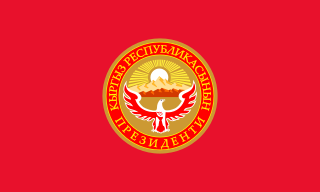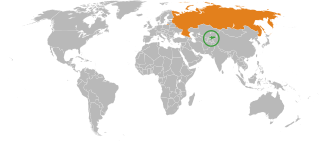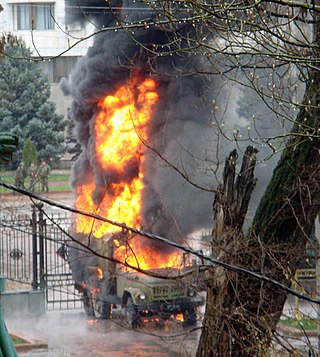
The history of the Kyrgyz people and the land now called Kyrgyzstan goes back more than 3,000 years. Although geographically isolated by its mountainous location, it had an important role as part of the historical Silk Road trade route. Turkic nomads, who trace their ancestry to many Turkic states such as the First and Second Turkic Khaganates, have inhabited the country throughout its history. In the 13th century, Kyrgyzstan was conquered by the Mongols; subsequently it regained independence but was invaded by Kalmyks, Manchus, and Uzbeks. In 1876, it became part of the Russian Empire, remaining in the USSR as the Kirghiz Soviet Socialist Republic after the Russian Revolution. Following Mikhael Gorbachev's democratic reforms in the USSR, in 1990 pro-independence candidate Askar Akayev was elected president of the SSR. On 31 August 1991, Kyrgyzstan declared independence from Moscow, and a democratic government was subsequently established.

The politics of Kyrgyzstan, officially known as the Kyrgyz Republic, takes place in the framework of a presidential system representative democratic republic, whereby the President is head of state and the Chairman of the Cabinet of Ministers is head of government. Executive power is exercised by the government. Legislative power is vested in both the government and parliament. The Economist Intelligence Unit rated Kyrgyzstan an "authoritarian regime" in 2022.

Kyrgyzstan has close relations with other members of the Commonwealth of Independent States, particularly Kazakhstan and Russia, given the historical legacy of the Soviet Union. It also has close relations with Turkey as well, given their shared heritage as Turkic languages.

Kyrgyzstan, officially the Kyrgyz Republic, is a landlocked country in Central Asia, lying in the Tian Shan and Pamir mountain ranges. Bishkek is the capital and largest city of the country. Kyrgyzstan is bordered by Kazakhstan to the north, Uzbekistan to the west, Tajikistan to the south, and China to the east and southeast. Ethnic Kyrgyz make up the majority of the country's 7 million people, followed by significant minorities of Uzbeks and Russians.

The president of Kyrgyzstan, officially the president of the Kyrgyz Republic, is the head of state and head of government of the Kyrgyz Republic. The president directs the executive branch of the national government, is the commander-in-chief of the Kyrgyz military and also heads the National Security Council.

Roza Isakovna Otunbayeva is a Kyrgyz diplomat and politician who served as the President of Kyrgyzstan from 7 April 2010 until 1 December 2011, becoming the first female Central Asian head of state. She was sworn in on July 3, 2010, after acting as interim leader following the 2010 April Revolution, which led to the ousting of President Kurmanbek Bakiyev. She previously served as Minister of Foreign Affairs and as head of the parliamentary caucus for the Social Democratic Party of Kyrgyzstan.

Kurmanbek Saliyevich Bakiyev is a Kyrgyz politician who served as the second president of Kyrgyzstan, from 2005 to 2010. Large opposition protests in April 2010 led to the takeover of government offices, forcing Bakiyev to flee the country.

The chairman of the Cabinet of Ministers of Kyrgyzstan, formerly known as the prime minister of Kyrgyzstan chairs the Cabinet of Ministers of the Kyrgyz Republic.

The Supreme Council is the unicameral parliament of the Kyrgyz Republic. It was known as the Supreme Soviet of the Kirghiz Soviet Socialist Republic until 1991.

Almazbek Sharshen uulu Atambayev is a Kyrgyz politician who served as the President of Kyrgyzstan from 1 December 2011 to 24 November 2017. He was Prime Minister of Kyrgyzstan from 17 December 2010 to 1 December 2011, and from 29 March 2007 to 28 November 2007. He served as Chairman of the Social Democratic Party of Kyrgyzstan (SDPK) from 30 July 1999 to 23 September 2011.

Kyrgyzstan–Russia relations are the relations between the two countries, Kyrgyzstan and Russia. Russia has an embassy in Bishkek and a consulate in Osh, and Kyrgyzstan has an embassy in Moscow, a consulate in Ekaterinburg, and a vice-consulate in Novosibirsk.

China–Kyrgyzstan relations are the bilateral relationship between China and Kyrgyzstan.

Greece–Kyrgyzstan relations are foreign relations between Greece and Kyrgyzstan. Both countries established diplomatic relations in 1992. Greece is represented in Kyrgyzstan through its embassy in Almaty (Kazakhstan). Kyrgyzstan is represented in Greece through a non resident ambassador based in Bishkek. Kyrgyz consular representation in Greece is made by the Kazakh consulate in Athens. What is now Kyrgyzstan was settled by Scythians and was conquered by Alexander the Great.

India–Kyrgyzstan relations are the relations between India and Kyrgyzstan.

The 2010 Kyrgyz Revolution, also known as the Second Kyrgyz Revolution, the Melon Revolution, the April Events or officially as the People's April Revolution, began in April 2010 with the ousting of Kyrgyz president Kurmanbek Bakiyev in the capital Bishkek. It was followed by increased ethnic tension involving Kyrgyz people and Uzbeks in the south of the country, which escalated in June 2010. The violence ultimately led to the consolidation of a new parliamentary system in Kyrgyzstan.

Sooronbay Sharip uulu Jeenbekov is a Kyrgyz politician who served as the 5th President of Kyrgyzstan from 2017 until his resignation in 2020, following a week of protests. Prior to that he served as the Prime Minister of Kyrgyzstan from April 2016 to August 2017.

Diplomatic relations between Azerbaijan and Kyrgyzstan were established on January 19, 1993.

The 2020 Kyrgyz Revolution, also known as the Third Kyrgyz Revolution, began on 5 October 2020, in response to the previous day's parliamentary election that was perceived by protestors as unfair, with allegations of vote rigging. The results of the election were annulled on 6 October 2020. On 12 October 2020, President Jeenbekov announced a state of emergency in the capital city of Bishkek, which was approved by Parliament the following day. Jeenbekov resigned on 15 October 2020.

Sadyr Nurgojo uulu Japarov is a Kyrgyz politician who is currently serving as the president of Kyrgyzstan since 28 January 2021. He had previously served as the acting prime minister of Kyrgyzstan in the 2020 interim government following the resignation of President Sooronbay Jeenbekov. Japarov also became acting president of Kyrgyzstan after Jeenbekov's resignation but resigned himself on 14 November 2020 to run for the 2021 presidential election, where he was elected to succeed the acting president Talant Mamytov.

The Constitution of Kyrgyzstan is the supreme law of the Kyrgyz Republic. Kyrgyzstan first got a constitution in 1993, a year and a half after the country had gained independence from the Soviet Union in 1991. It has gone through a few constitutions, with the last one being adopted in April 2021.

















